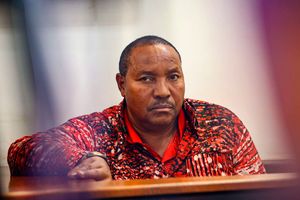Infections rise as experts warn of third Covid wave in Kenya

Kenyatta National Hospital nurse Lucy Kipkemei vaccinates CEO Evanson Kamuri against Covid-19 during the launch of Kenya's campaign at the hospital in Nairobi on March 5, 2021.
What you need to know:
- The Covid-19 cases rose to a peak in June and July last year, then dropped sharply, only to rise again to a new peak in October and November, before going to a new low level in January and early February.
Experts have warned of a possible third wave of Covid-19 in the country due to the recent spike in new cases.
Health Cabinet Secretary Mutahi Kagwe urged Kenyans to remain on high alert while following Covid protocols, such as social distancing, wearing face masks and washing hands regularly with soap and running water.
A wave is the fluctuating movement of aggregated numbers of something that can move up to a peak, then drop considerably, happening repetitively.
The Covid-19 cases rose to a peak in June and July last year, then dropped sharply, only to rise again to a new peak in October and November, before going to a new low level in January and early February.
In the last three weeks, however, the numbers have started rising again and the nation is in a new wave that is heading to a new high, projected to peak at the end of March or early April.
“We can only hope that due to past exposure making a significant part of the population immune (estimated at 40 to 50 per cent), the extent of the spread and its intensity will not be as bad as the second wave when we had the highest number of deaths and hospitalisations,” said Dr Ahmed Kalebi of Pathologist Lancet Kenya.
1.3 million tests
Since March last year when the first case was confirmed, a total of 108,362 cases have been reported and 1,876 people have died. Kenya has so far conducted 1.3 million tests.
The new wave comes at a time when the world is experiencing more contagious variants of the virus, raising concerns about the effectiveness of the current vaccines against mutations.
There are multiple, more contagious variants emerging around the globe. The three main variants of concern so far were first identified in the United Kingdom, South Africa and Brazil.
The B.1.1.7 lineage, which was first detected in the UK in December last year, has now been identified in at least 80 countries. While the one that was first identified in South Africa, also in December, has been identified in at least 41 countries.
The third was identified in travellers from Brazil, also in December, and has been identified in at least 15 countries.
Past infections
In Kenya, there has been a suspected case of one of the variants.
Studies suggest that the vaccines currently in use can recognise the variants but are unlikely to provide as much protection against them.
Some variants found in parts of the world appear more contagious and may evade immunity provided by past infection, scientists say.
Preliminary work that looked into the genomics and epidemiology of a novel SARS-CoV-2 lineage in Manaus, for example, indicates that the chances of Brazil coronavirus reinfection at between 25 and 60 per cent.
The variant from South Africa, for example, reduced Pfizer-BioNTech’s antibody protection by two-thirds, according to a February study. Moderna’s neutralising antibodies dropped six-fold with the South Africa variant.
But experts say this should not be used to predict what may happen in Kenya. They insist the available vaccines should work against the variants.
Dr Ombeva Malande, a vaccinologist and senior consultant, said the variants have not been reported in East Africa.
Not a major issue
South Africa has been working with Johnson & Johnson vaccine, which handles their particular strain, while other countries have considered offering a third dose of the vaccines should there be reported cases of the variants.
The fact that Russia’s Sputnik V vaccine will share science with pharmaceutical giant AstraZeneca to explore possible advances against the virus also gives assurance of maximum protection of the vaccines.
“There has also been aggressive screening of travellers from these particular countries,” said Dr Malande.
Health Specialist at Unicef Kenya, Dr Peter Okoth, said the committee of experts considered the South African variant, and “it is not a major issue in the country at the moment”.
“The new wave is not in any way related to the variants because there is surveillance going on and so far, nothing has been picked. The new wave has nothing to do with the new variants rather it could be as a result of people dropping their guard,” he said.
He said that even with the variants, people should still go for the vaccine because it provides a certain level of protection against the virus.





